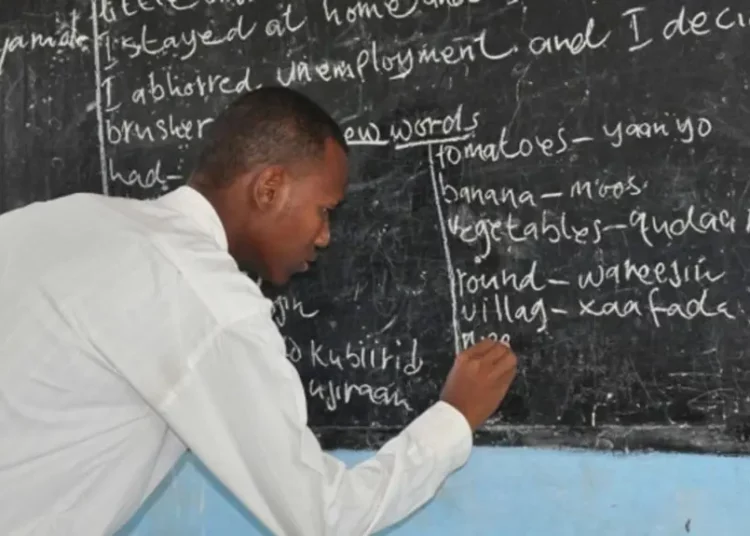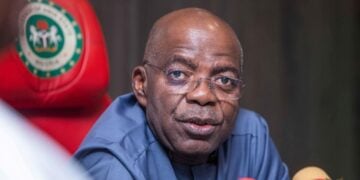The Nigeria Union of Teachers (NUT) has raised the alarm over an acute shortage of qualified teachers in Nigeria’s public schools, describing the situation as a national crisis threatening the country’s education system.
Speaking at the grand finale of the 2025 World Teachers’ Day celebration held yesterday at Eagle Square, Abuja, the National President of the NUT, Comrade Audu Titus Amba, said the shortage of teachers had reached a critical point.
He said, “It is alarming that Nigeria has a shortage of 194,876 teachers in public primary schools nationwide. The situation in our secondary schools is not encouraging either. This manpower crisis has grave implications for our schools’ quality of education and learning outcomes.
Amba cited statistics from the Universal Basic Education Commission (UBEC), warning that the widening deficit undermines Nigeria’s commitment to Sustainable Development Goal 4 (SDG 4), which is to ensure quality education for all.
“We add our voice to the global call to make teaching more attractive to younger generations. Government must employ the right number and quality of teachers to sustain effective education delivery in our school system,” he said.
Amba also lamented that, despite promises made since 2020 to improve teachers’ welfare, many of the incentives approved by the Federal Government remain unfulfilled.
“It is worrisome that apart from the new retirement age of 65 years, which 22 states and the FCT have implemented, most of the approved incentives have not been fulfilled. We call on both Federal and State Governments to fully implement these welfare packages to restore dignity and pride to the teaching profession,” he said.
He further decried the delay in implementing the 2024 National Minimum Wage, revealing that ten states have not fully implemented the new minimum wage for teachers, while four have not.
The union leader also called on the Federal Government to revisit its decision to delist the Teachers Registration Council of Nigeria (TRCN) from public funding, stressing that the council is crucial to maintaining professional standards in education.
“Teachers are the foundation of any education system. The TRCN must be properly funded to ensure only trained and qualified teachers are engaged in our classrooms,” Amba stated.
He condemned the growing privatisation of public schools, particularly the handover of public schools to missions or private agencies, describing it as a worrisome policy shift threatening access to free and inclusive education.
“Education is a fundamental human right guaranteed by our Constitution. Policies that promote privatisation create social inequalities and deprive vulnerable children, especially the girl-child and those in rural areas, of access to education.”
Amba also drew attention to the plight of teachers in federal unity schools, calling for the promotion of those who have passed their examinations, payment of salary arrears owed since 2018, and regularisation of verified PTA teachers.
Meanwhile, the Federal Government reaffirmed its commitment to empowering teachers through reforms and policies that improve professional development, collaboration, and welfare.
Speaking at the event, the Minister of Education, Dr Maruf Olatunji Alausa, said the government remained dedicated to promoting teachers’ growth and ensuring quality education delivery nationwide.
“It is remarkable that the global community acknowledges the selfless dedication of teachers who remain the foundation of development in all climes. Rewarding teachers is an investment in quality education, student achievement, and national progress,” he said.
Dr Alausa noted that teacher collaboration leads to better learning outcomes and greater professional fulfilment. “When teachers are supported to work together through peer mentoring, joint lesson planning, co-teaching, and digital platforms, learning outcomes improve, and teachers experience professional growth,” he stated.
He also said the ministry had rolled out several initiatives to revitalise the profession, including the National Teacher Policy, which empowers and motivates teachers through continuous training and career support.
The Minister of State for Education, Prof Suwaiba Said, emphasised the need to build trust and shared responsibility among educators to overcome resistance to collaboration.
She said recognising outstanding educators would inspire excellence and attract new talent to the teaching profession.
“Celebrating teachers’ contributions not only honours their efforts but also encourages others to aspire towards excellence,” she said.
The event also featured the President’s Teachers and Schools Excellence Awards, where outstanding educators and schools were recognised for their exceptional contributions to learning and national development.
Emmanuel Ozor Charles of Greater Tomorrow International College, Ondo, led the awardees, who emerged as the Best Public Private School Teacher, winning N3.5 million.
Solanke Francis Taiwo of Ansar-Udeen Main School, Kemta, Abeokuta, Ogun State, won the Best Teacher award for his exceptional commitment to nurturing young minds.
Woliwo Primary School, Onitsha, Anambra State, in the Basic School category, clinched the Best School (BUS) award. At the same time, Onike Girls Junior High School, Lagos, was named Best Junior Secondary School (BUS) for its remarkable record in academic performance and girl-child empowerment.
With a N3.5 million prize, the Best School Leader award went to Mrs Odenike Fausat Mobolaji of Elepe Community Junior High School, Ikorodu, Lagos, for her outstanding leadership and mentorship.
Similarly, Fayomi Felix of Idepe High School, Okitipupa, Ondo State, received N3.5 million as Best Public School Teacher. At the same time, Ubani Roseblund Ibiyiye of Federal Government College, Abuloma, clinched the coveted Best Teacher Award, representing the pinnacle of teaching excellence in Nigeria.
World Teachers’ Day, celebrated globally every 5th October, was first proclaimed in 1994 by UNESCO in collaboration with the International Labour Organisation (ILO), Education International (EI), and UNICEF to honour teachers’ contributions to national and global development.
This year’s theme for the celebration is “Recasting Teaching as a Collaborative Profession.”





